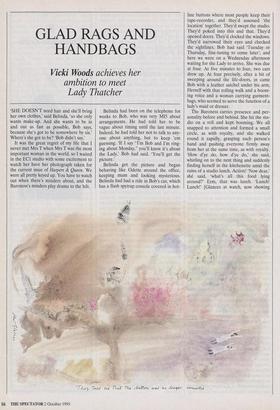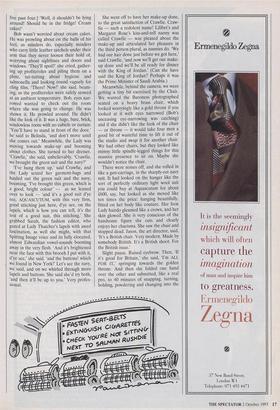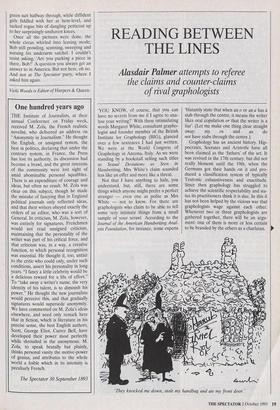GLAD RAGS AND HANDBAGS
Vicki Woods achieves her ambition to meet Lady Thatcher
'SHE DOESN'T need hair and she'll bring her own clothes,' said Belinda, 'so she only wants make-up. And she wants to be in and out as fast as possible, Bob says, because she's got to be somewhere by six.' Where's she got to be? 'Bob didn't say.'
It was the great regret of my life that I never met Mrs T when Mrs T was the most important woman in the world, so I waited in the EC1 studio with some excitement to watch her have her photograph taken for the current issue of Harpers dc Queen. We were all pretty keyed up. You have to watch out when there's minders about, and the Baroness's minders play drama to the hilt. Belinda had been on the telephone for weeks to Bob, who was very MIS about arrangements. He had told her to be vague about timing until the last minute. Indeed, he had told her not to talk to any- one about anything, but to keep 'em guessing. 'If I say "I'm Bob and I'm ring- ing about Monday," you'll know it's about the Lady,' Bob had said. 'You'll get the picture.'
Belinda got the picture and began behaving like Odette around the office, keeping mum and looking mysterious. Belinda had had a ride in Bob's car, which has a flash spytrap console covered in hot- line buttons where most people keep their tape-recorder, and they'd assessed 'the location' together. They'd swept the studio. They'd poked into this and that. They'd opened doors. They'd clocked the windows. They'd narrowed their eyes and checked the sightlines. Bob had said 'Tuesday or Thursday, fine-tuning to come later'; and here we were on a Wednesday afternoon waiting for the Lady to arrive. She was due at four. At five minutes to four, two cars drew up. At four precisely, after a bit of sweeping around the life-doors, in came Bob with a leather satchel under his arm, Herself with that rolling walk and a boom- ing voice and a woman carrying garment- bags, who seemed to serve the function of a lady's maid or dresser.
The Baroness carries presence and per- sonality before and behind. She hit the stu- dio on a roll and kept booming. We all snapped to attention and formed a small circle, as with royalty, and she walked round it rapidly, grasping each person's hand and pushing everyone firmly away from her at the same time, as with royalty. 'How d'ye do, how d'ye do,' she said, whirling on to the next thing and suddenly finding herself in the kitchenette amid the ruins of a studio lunch. Action! 'Now dear,' she said, 'what's all this food lying around?' Erm, that was lunch. 'Lunch! Lunch!' [Glances at watch, now showing five past four.] 'Well, it shouldn't be lying around! Should be in the fridge! Cream cakes!'
Bob wasn't worried about cream cakes. He was prowling about on the balls of his feet, as minders do, especially minders who carry little leather satchels under their arm that they never loosen their hold of, worrying about sightlines and doors and windows. 'They'll spoil!' she cried, gather- ing up profiteroles and piling them on a plate, tut-tutting about hygiene and salmonella and looking round vaguely for cling film. 'There! Now!' she said, beam- ing, as the profiteroles were safely stowed at an ambient temperature. Bob, eyes nar- rowed wanted to check out the room where she was going to change. He was shown it. He prowled around. He didn't like the look of it. It was a huge, bare, brick, windowless room with no cubicle or curtain. 'You'll have to stand in front of the door,' he said to Belinda, 'and don't move until she comes out.' Meanwhile, the Lady was moving towards make-up and booming about clothes. She turned to her dresser. `Crawfie,' she said, unbelievably, `Crawfie, we brought the green suit and the navy?'
'I've hung them up,' said Crawfie, and the Lady seized her garment-bags and hauled out the green suit and the navy, booming, 'I've brought this green, which is a good, bright colour' — as we leaned over to look — 'and it's a good suit d'ye see, AQUASCUTUM, with this very firm, good stitching just here, d'ye see, on the lapels, which is how you can tell, it's the test of a good suit, this stitching.' She grabbed Sarah, the fashion editor, who gazed at Lady Thatcher's lapels with awed fascination, as well she might, with that Spitting Image voice and its fully elocuted, almost Edwardian vowel-sounds booming away in the very flesh. 'And it's brightened near the face with this brooch I put with it, d'ye see,' she said, 'and the buttons! which we found in New York!' Let's see the navy, we said, and on we whirled through more lapels and buttons. She said she'd try both, 'and then it'll be up to you.' Very profes- sional.
She went off to have her make-up done, to the great satisfaction of Crawfie. Craw- fie — such a redolent name! Lilibet's and Margaret Rose's kiss-and-tell nanny was called Crawfie — was pleased about the make-up and articulated her pleasure in the third person plural, as nannies do. 'We had our hair done just before we got here,' said Crawfie, 'and now we'll get our make- up done and we'll be all ready for dinner with the King of Jordan.' (Can she have said the King of Jordan? Perhaps it was the Prime Minister of Saudi Arabia.) Meanwhile, behind the camera, we were getting a tiny bit exercised by the Chair. We wanted the Baroness photographed seated on a heavy brass chair, which looked worryingly like a gold throne if you looked at it with eyes narrowed (Bob's unceasing eye-narrowing was catching) and if she didn't like the look of the chair — or throne — it would take four men a good bit of wasteful time to lift it out of the studio and swap it for another chair. We had other chairs, but they looked like mimsy little spindle-legged things for this massive presence to sit on. Maybe she wouldn't notice the chair.
There were noises off, and she rolled in like a gun-carriage, in the sharply-cut navy suit. It had looked on the hanger like the sort of perfectly ordinary light wool suit you could buy at Aquascutum for about £600, say, but looked as she moved like ten times the price: hanging beautifully, fitted on her body like couture. Her Iron Lady hairdo gleamed like a crown, and her skin glowed. She is very conscious of the handsome figure she cuts and clearly enjoys her charisma. She saw the chair and stopped dead. Jason, the art director, said, 'It's a British chair. Very modern. Made by somebody British. It's a British shoot. For the British issue.'
Slight pause. Raised eyebrow. Then, 'If it's good for Britain,' she said, 'I'm ALL FOR IT,' springing towards the golden throne. And then she folded one hand over the other and submitted, like a real pro, to 40 minutes of snapping, turning, holding, powdering and changing into the
green suit halfway through, while diffident girls fiddled with her at hem-level, and tucked rogue bits of dangling petticoat up to her surprisingly unshaven knees.
Once all the pictures were done, the whole circus whirled into leaving mode; Bob still prowling, scanning, sweeping and nursing his underarm satchel. I couldn't resist asking, 'Are you packing a piece in there, Bob?' A question you always get an answer to in America. But not here, oh no. And not at The Spectator party, where I asked him again.
Vicki Woods is Editor of Harpers & Queen.




















































 Previous page
Previous page